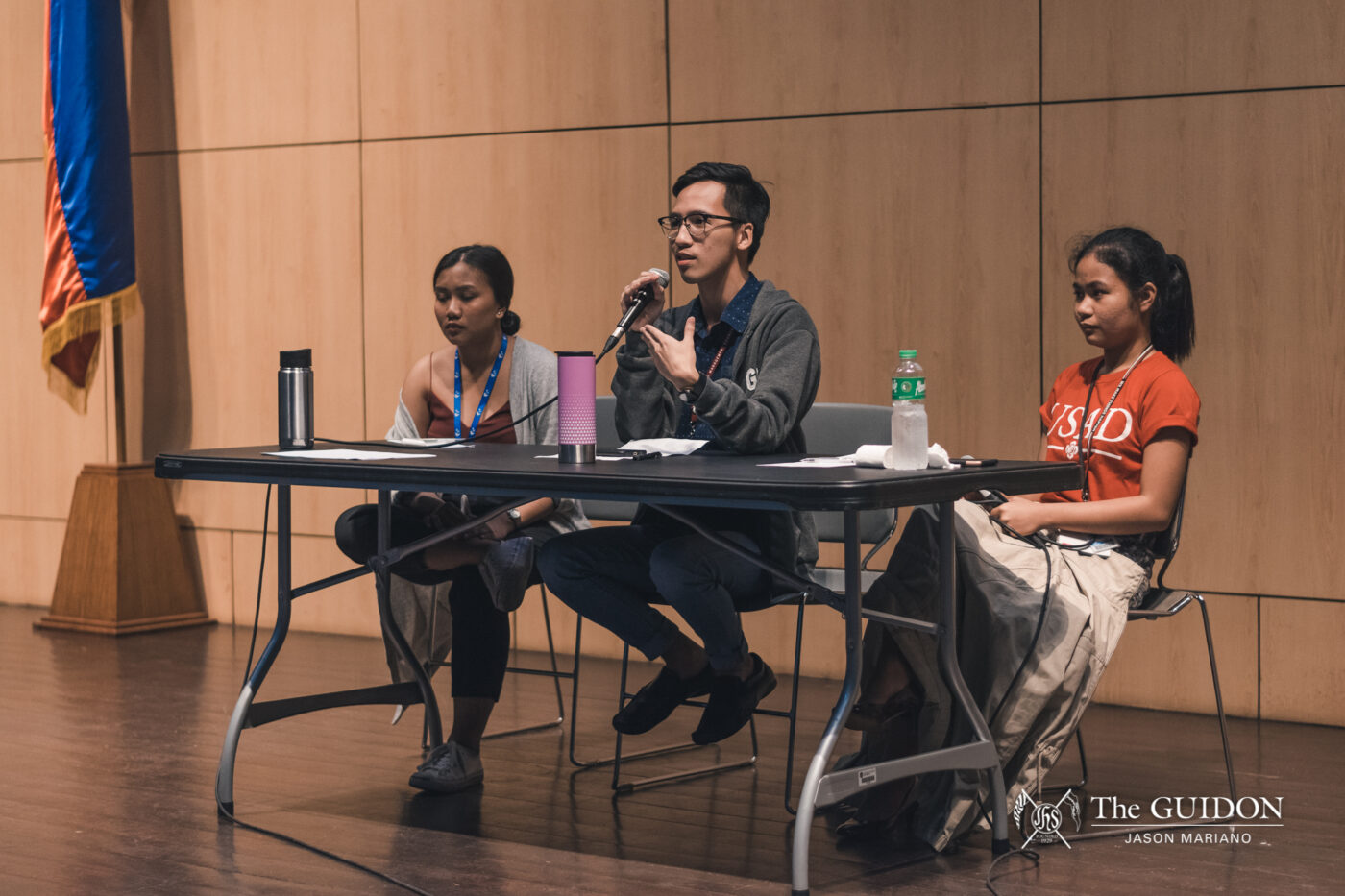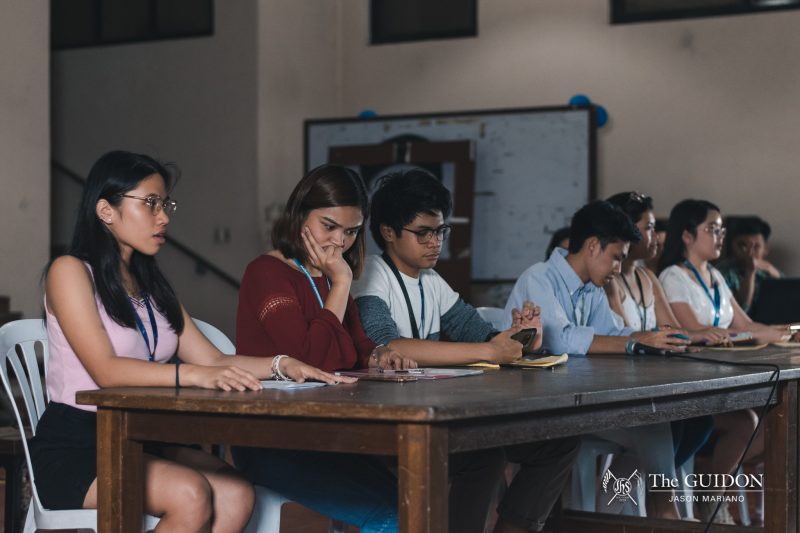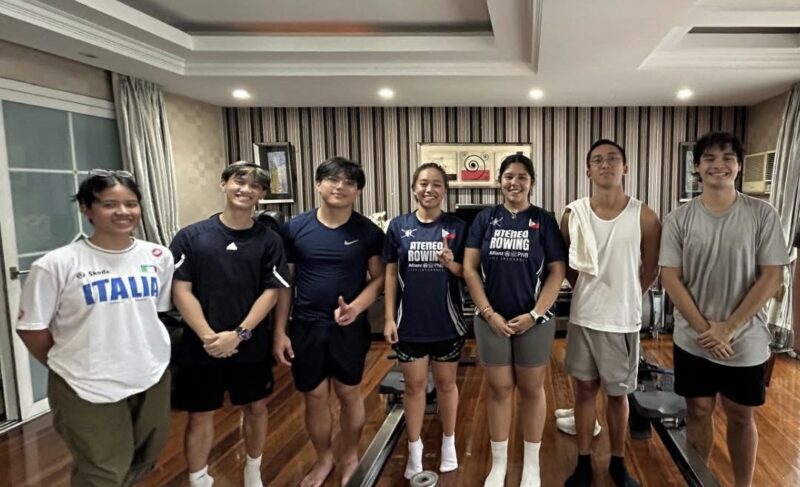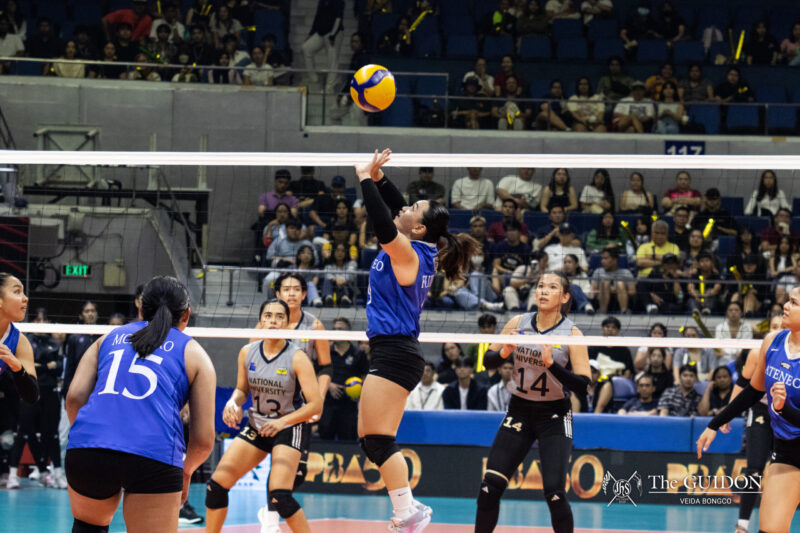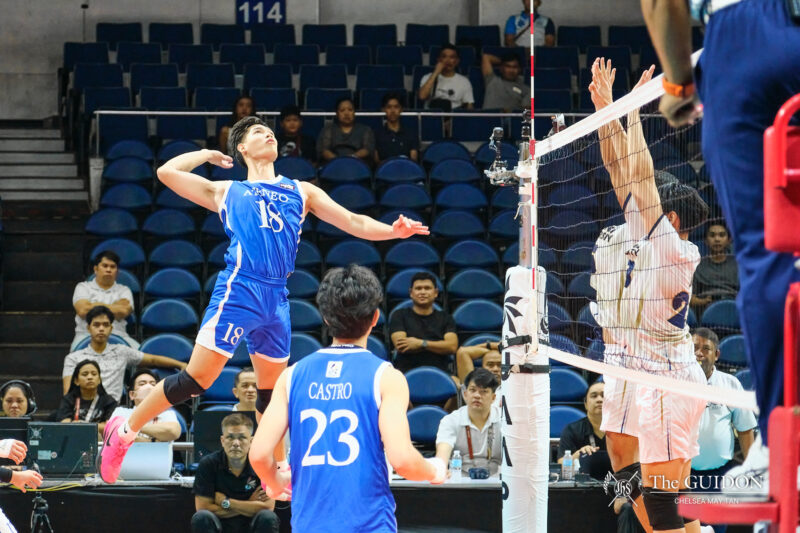WITH HIGH hopes for a stronger student government, the candidates of the top Sanggunian positions laid down their perspectives on issues within and outside the student government in the presidential and vice-presidential (PVP) debates on March 13 at the Leong Hall Auditorium.
Participating candidates included Union of Students for the Advancement of Democracy (USAD) stalwarts Hya Bendaña and Aly Alberto, running for president and vice president respectively; and Green Coalition of the Ateneo’s vice presidential candidate Niels Nable.
The event was a continuation of the two-part Sanggunian debates series, following the school representative (SR) debates on March 12.
Diagnosing Sanggu
The candidates began the debates with a dialogue on the issues that plague the Sanggunian, as well as their respective plans for the student government.
“Ang [namumunong] Sanggunian [ngayon ay] maraming nagawa, pero marami ring pagkukulang (The [incumbent] Sanggunian has done many things, but it also has its shortcomings),” said Beñdana in her opening statement as she and USAD running-mate Alberto expressed a desire to “move forward.”
“There were things that were not fulfilled, but this does not mean that USAD did not try. We will try better,” Alberto said.
Meanwhile, Nable challenged his fellow candidates and asked the audience,“Bakit nga ba tayo tumatakbo? Para pagandahin ang résumé natin, o dahil nais nating maglingkod sa bayan? (Why are we actually running? For us to improve our résumé, or to serve our people?)”
He stressed that the student body should be voting for candidates who have “experience” in the Sanggunian. He expressed the importance of transparency and honesty as the primary duty of those elected in office.
“Vote for leaders who have actually proven their worth in the Sanggunian. We need vision and experience,” he said.
During the debate proper, the candidates gave their thoughts on the low voter turnout from the student body during Sanggunian elections, the most recent being 18.6% from the 2017 General Elections. Bendaña said that this is mainly a problem of “miscommunication.”
“Hindi nagpa-participate ang mga estudyante dahil hindi nga nila alam na may ginagawa pala ang Sanggunian. Kailangan silang ligawan; ito ang ginagawa namin (Students don’t participate because they don’t know that the Sanggunian is actually doing something. They have to be courted; this is what we are doing),” she said.
During the debates, the candidates were also questioned on the relevance of the Sanggunian among the student body.
Alberto said that this may be attributed to the strong “culture of organizations” present in the University and added that creating “spaces for collaboration” between the organizations and the Sanggunian can solve this.
Nable responded by saying, “Maraming concerns ang mga estudyante ng Ateneo na hindi matutugunan ng mga orgs (There are a lot of concerns from Ateneo students that cannot be solved by organizations).”
Tuition, sectoral concerns
Asked about the annual tuition fee increase due to the dip in enrollment caused by the new K-12 curriculum, Bendaña said that she is not in favor of the tuition hike and proposed for a more “aggressive” Loyola Schools (LS) Budget Committee in forwarding tuition reform policies, as well as a stakeholders committee that includes the Ateneo Employers and Workers Union, the Ateneo Schools Parents Council, and the student body.
She added that costs incurred by inflation, as well as the implementation of the new K-12 curriculum cannot be controlled, which calls for more reform regarding the budget.
The candidates were also questioned on how they would address the delays in the implementation of sectoral representation in the Sanggunian.
Alberto stressed the need to lobby for a “stronger committee” for sectoral representation on campus. Aside from this, she also wants to provide sectors the necessary legal aid and means in applying for representation.
“Hindi pwedeng mag-assert ang Sanggunian na ito ang sectors [ninyo]. Kailangan nating tulungan ang mga wala pang sector [para magkaroon ng representasyon] (The Sanggunian cannot assert that these are the [student body’s] sectors. We have to help those who do not have sectors [to have representation]),” she said.
Nable said that “lack of awareness” from the student body regarding sectoral representation is a cause for the delay, citing the need for “grassroots democracy” in consulting with possible sectors. He said that he will personally handle the program if he is given the vice presidential position.
On national issues
Bendaña and Nable had a heated exchange regarding the university’s accommodation for Lakbayan ng Pambansang Minorya (Lakbayan) delegates. Lakbayan is a nationwide protest by IP groups pushing for anti-militarization and anti-land grabbing in their communities.
According to Nable, the University did not let the IPs inside the doors of Ateneo in the previous year. Bendaña answered that it was because of “security and [administrative] concerns,” and that “there are contentions on ideologies that we have to respect.”
Nable then asked, “Puro awareness na lang ba tayo dito sa Ateneo? (Are we just aiming for awareness here in the Ateneo?)” In her response, Bendaña clarified that there was a need to comply with the requirements of the University in order to accommodate the members of Lakbayan inside campus.
“Kapag nandyan na talaga sa Ateneo, papasukin sila, [pero] hindi naman pwedeng bigla-bigla na lang. There are democratic processes [that we have to observe.] (If they are already in Ateneo, we will let them in, but we cannot do so in an abrupt manner. There are democratic processes [that we have to observe]),” she explained.
The PVP candidates also shed light on how the Sanggunian could respond to the TRAIN law, given that it is an “anti-poor” policy that does not cater to inclusive economic growth, as Nable stated.
Alberto pointed out that the biggest casualty of the TRAIN law would be the scholars in the University, due to its association with the increase in the prices of goods such as sugar-sweetened beverages and cigarettes.
She said that a system such as the Student Activities Fund (SAF) should be utilized to ensure that no student will suffer under the policy. The SAF is the pool of funds collected from students’ tuition fees allocated for organizations, student activities, and the Sanggunian.
Nable shared the same sentiment, saying that the SAF should be reallocated to scholars and students from the “middle class,” for the university also has students who are financially challenged even if they are not scholars.
On externalization
Another question was raised on how the Sanggunian plans to strengthen the Katipunan Coalition, the alliance of student governments in Katipunan schools which include the Ateneo Loyola Schools and Senior High School, University of the Philippines Diliman, and Miriam College.
For Bendaña, the current plan is “to have a conversation [with other Katipunan schools] right now” and seal Memoranda of Agreement (MOAs) with them.
She also mentioned that the issues to be brought up in the Coalition’s discussion are Charter Change, and martial law in Mindanao.
As for the possible ideological differences of Katipunan schools that could be a problem for the coalition, Bendaña explained that it would not be a hindrance in forwarding the coalition’s advocacies.
“Magkasama naman tayo in terms of holding this government accountable (We are together in holding this government accountable),” she said. “Mapag-uusapan natin kung anong klaseng response [ang kailangan] when it comes to [the Coalition’s] engagements (We can agree on the kind of response needed when it comes to [the Coalition’s] engagements).”
Nable then emphasized the need to fix the Sanggunian internally so they could improve with external engagements.
“Aayusin ko ang Sanggunian upang ang external engagements natin ay mas malaki ang reach (I will fix the Sanggunian so we could have a wider reach for external engagements),” he said.
Alberto then said that “externalization is also a process,” and that there is a need for students to know about the issues within the University before they go out and respond to external issues.
“The answer is to build a community that is inclusive of all the issues inside [the University]. Hindi naman ang pagsagot lang sa kung ano ang nasa labas ang dapat nating unahin. Bakit hindi natin puwede ‘tong gawin at the same time? (The answer is to build a community that is inclusive of all the issues inside [the University]. We do not just put responding to the external issues first. Why don’t we do both at the same time?)” she said.
Reactions to contentions
The PVP debates were also met with varied reactions from social media as students and alumni weighed in on the statements made by the candidates during the debates.
Incumbent John Gokongwei School of Management Representative Alec Lim said on Twitter: “I think part of what makes the Sanggunian debates this year so heavy is the drag-people-to-the-ground culture.” He added that this culture may turn out to be a “deterrent for people to run” and it causes constituents to overlook giving candidates advice on “how to go about the work itself.”
Meanwhile, diplomacy and international relations junior Marielle Castellano expressed in her tweet, “It seems that there has been a misunderstanding on what a debate is. In a debate, you argue on the points made by the opposition. You do not attack the person himself or herself.”
During the debate proper, Nable questioned Bendaña’s Facebook post endorsing Alberto as her vice president. The post stated that Alberto was able to pass a resolution on a Student Development Plan “aimed to conduct a full-blown research on student priority needs.”
Nable questioned Bendaña about the research and asked, “Is this really legit na mayroon talaga tayong na-produce [na research], or are we deceiving the student body na mayroon na talagang full-blown research? (Is this really legitimate that we produced [a research], or are we deceiving the student body that we have a full-blown research?)”
Nable added that the post had been edited and more than 100 people shared the profile picture. “What does this say about you as a future president of Sanggunian?” he asked.
In response, Bendaña said the post stated that Alberto passed a resolution for the establishment of the Student Development Plan, and that the research has yet to happen.
“There has been a resolution na napasa that aims for the Student Development Plan, na ibig sabihin is to conduct this research. Nakalagay doon na yung resolution pa lang ‘yung napasa at hindi pa yung survey. If you keep attacking ad hominem, I think you should search more in terms of substance,” she said.
(There has been a resolution that was passed that aims for the Student Development Plan, which means to conduct this research. It says there that only the resolution was passed and not the survey. If you keep attacking ad hominem, I think you should search more in terms of substance.)
Meanwhile, former School of Social Sciences Representative Christian Dy (AB EC ‘17) said in a tweet that the Sanggunian Debates lacked what he called “compassionate wonkery: well-studied, well crafted proposals for real issues that affect real people.”
He also gave his thoughts on the relevance of the Sanggunian in the student government and pointed out that“in a community of 8,000 [students] of supposedly the country’s best, participation should not be difficult.”
“Sanggunian is relevant. If we keep talking about relevance instead of working hard, we won’t go anywhere,” he said in another tweet.

